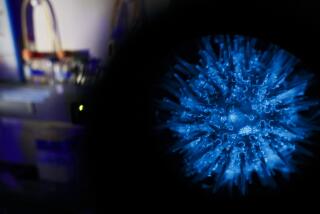Scientific Panel Calls for Voluntary Ban on Gene-Altering Research
- Share via
WASHINGTON — Lucy the Mouse sported an “artificial chromosome,” inserted by scientists, which she passed on to her children. Ucp, a mouse with a less elegant name, was programmed genetically to pass his underweight condition to countless generations of offspring. And Dolly, the world-famous sheep, raised the prospect that parents might live forever, in a fashion, by producing cloned children identical to themselves.
For years, scientists have been tinkering with animal genes and cells to produce changes that are passed through generations. Now, with the specter of human experiments on the horizon, scientists and ethicists are raising a red flag.
On Monday, after more than two years of study, a panel of the American Assn. for the Advancement of Science called for researchers to adopt a self-imposed ban on gene-altering work and for the government to establish an oversight panel as soon as possible.
“We’re saying that no clinical trials should be taking place in this area,” said Mark S. Frankel, a staff member at the nation’s largest general science organization and coauthor of the report. “None.”
Genetic Diseases Could Be Targeted
The techniques that created Ucp and Lucy might one day help doctors cure human patients of such terrifying genetic illnesses as Huntington’s disease or cystic fibrosis--not only in themselves but in generations to come.
But the same technology could be used by parents in attempts to create “perfect children,” possibly taller, smarter or more athletic than their classmates. While fertility clinics would find it irresistible to offer these services, the panel said, none should be available before there is a wide-ranging public discussion about the implications.
Currently, scientists are testing gene therapies in dozens of clinical trials across the country, which drew headlines after the death of an 18-year-old man in a Pennsylvania experiment last year. Those trials are aimed at giving patients healthy, new genes to supplement faulty genes in the heart, blood vessels or elsewhere. Doctors want to help patients, not affect future children.
But the new research, which raises even thornier ethical questions, would alter genes in the sperm and egg cells of patients, which is why the effect would pass to their children. It is known as “inheritable genetic modification” or “germ-line modification,” a reference to sperm and egg, which are sometimes called germ cells.
Little or none of this research is being conducted today and one panel member predicted that it would be five to 15 years before human trials would become commonplace.
But the panel is worried that even trials of conventional gene therapy may have an effect on future generations. In some animal experiments, they said, gene therapy has shown signs of affecting sex cells, raising the prospect that the genes of offspring could be altered.
The panel also said that existing government oversight, tightened in the wake of last year’s gene therapy death, have not adequately investigated the possibility that current experiments are already modifying the genes of patients’ future children.
“We’re not saying it’s happening, but we’re not looking for it,” Frankel said. “It’s not part of the protocol to look for it and we’re saying it needs to be.”
The panel identified only one type of this research that is being conducted today. Known as “cytoplasmic transfer,” it is used rarely in fertility clinics to help women whose egg cells do not seem to be producing embryos that grow properly. The procedure attempts to “rejuvenate” the cells by inserting material from a donor’s egg.
The resulting baby would inherit not only its parents’ genes but a tiny amount of so-called mitochondrial genes from the donor. Cells use these genes to metabolize food into energy. Because the technique passes these new genes to the baby and all its future offspring, the panel said that fertility clinics should stop the procedure until the federal oversight board can study it.
But one fertility doctor rejected that idea. Jacques Cohen, who pioneered the technique at a New Jersey clinic, said the intent is to help couples have children, not to alter a patient’s genes. In fact, he said, in some cases his team looked for mitochondrial genes in babies born through cytoplasmic transfer and found none.
“The argument that this is a form of genetic modification is an extremely far stretch,” said Cohen, of the Institute for Reproductive Medicine and Science of St. Barnabas in Livingston, N.J. “We have not modified any individual genes.”
Cohen said that he had used the technique on 30 patients in four years, producing 15 births.
The scientific panel, which has 22 members and includes scientists, ethicists and theologians, said that technology would have to advance significantly before other types of gene-modification experiments could begin.
One member, Dr. Theodore Friedmann, director of the Program in Human Gene Therapy at UC San Diego, said that only “several percent” of attempts at producing gene-modified animals succeed. In most cases, the animal dies before or after birth or the modification does not have the desired effect.
Public Debate Is Demanded
But the panel also said that, even if the research were safe, it should not be conducted without a public debate on its ethics and merits. Parents who can modify their genes to produce healthier children will also be tempted to enhance other traits, they said.
“To be a parent, you don’t set out with your catalog and order form and check off boxes,” said Sondra Wheeler, a professor at Wesley Theological Seminary in Washington. “There is something distorted in that. We have the capacity to make children more like commodities and less like gifts, and that worries me a lot.”






